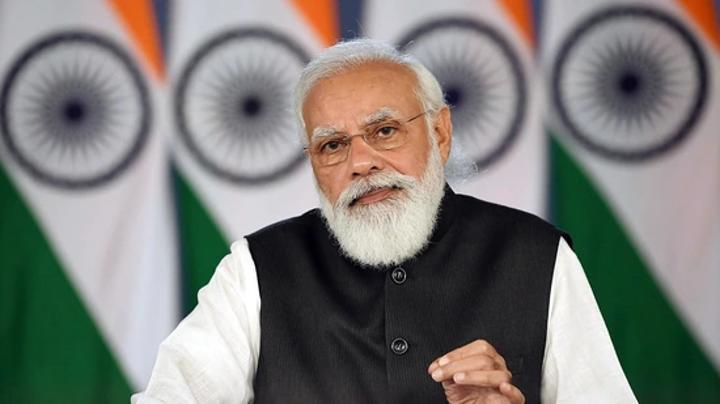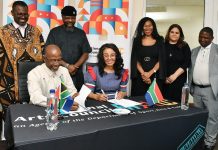Africa-Press – Ghana. Ghana is set to welcome India’s charismatic Prime Minister, Shri Narendra Modi, on a historic official visit from July 2 to 3, 2025, in a move widely expected to invigorate the longstanding ties between Accra and New Delhi.
The visit, which comes at a time of growing collaboration across development, trade, technology, and diplomacy, underscores the strategic importance both nations attach to their bilateral relations.
It also signals India’s renewed commitment to strengthening partnerships across Africa, with Ghana emerging as a key ally in the South-South cooperation.
Mr Modi, whose leadership has become synonymous with India’s economic transformation and technological ascendancy, will engage in high-level talks aimed at forging deeper cooperation in critical sectors while expanding the scope of people-to-people ties.
Humble Beginnings
Shri Narendra Modi was born on September 17, 1950, in the small town of Vadnagar in Gujarat, western India.
Born into a modest family, Modi’s early life was defined by hardwork, discipline, and service.
He helped his father to sell tea and eventually ran his own tea stall, an experience that left an indelible mark on his political ideology and emphasis on grassroots development.
His career in public life began with the Rashtriya Swayamsevak Sangh (RSS), a socio-cultural organisation focused on nation-building.
This early exposure to public service and discipline prepared him for a long political journey.
Later, he joined the Bharatiya Janata Party, where his skills as an organiser and strategist propelled him through the ranks.
Rising from modest beginnings to the pinnacle of global statesmanship, Prime Minister Modi is internationally recognised for reshaping India’s global footprint and accelerating its development agenda.
His upcoming engagements in Accra are expected to set the stage for new agreements and initiatives designed to drive shared prosperity and mutual progress.
The Government of Ghana, in collaboration with the Indian High Commission, is leaving no stone unturned in preparing for the landmark visit, which is anticipated to open a new chapter in Ghana-India relations.
National Leadership
Mr Modi first became a household name in India when he was appointed Chief Minister of Gujarat in 2001. The following 13 years, he built a reputation for strong governance, industrial growth, and infrastructural development.
By 2014, he emerged as the BJP’s prime ministerial candidate and swept to power with a historic electoral mandate, breaking decades of coalition politics in India.
He was re-elected in 2019 with an even larger majority and again in 2024, marking an unprecedented third consecutive term, the first Indian Prime Minister since Jawaharlal Nehru to achieve such a feat.
Modi’s leadership has focused on making India a self-reliant, technologically advanced, and economically resilient nation.
His governance has seen India launching several ambitious schemes: the Jan Dhan Yojana for financial inclusion; Ayushman Bharat, the world’s largest healthcare scheme; Swachh Bharat, a national sanitation campaign; and PM Awas Yojana, which has built over 42 million homes.
Mr Modi’s policies have emphasised last-mile delivery, benefiting millions of rural and underprivileged Indians.
Economic Vision
Prime Minister Modi has championed economic reforms, including the introduction of the Goods and Services Tax, which unified India’s tax structure into “One Nation, One Tax.”
He has promoted digital transformation through the Digital India initiative and driven the Made-in-India campaign to position India as a global manufacturing hub.
His government has significantly improved India’s ranking in the World Bank’s Ease of Doing Business Index, moving from 142 in 2014 to 63 in 2019.
Foreign Direct Investment inflows into India surged during his tenure, and global corporations now see India as a key market and production base.
Modi has also prioritised agricultural development, launching the PM-KISAN programme to provide direct financial assistance to over 92 million farmers.
His administration has introduced Soil Health Cards, e-NAM for digital farm trading, and created a separate Ministry of Jal Shakti to manage water resources holistically.
Global Reach
In foreign affairs, Modi has carved out a unique diplomatic style; personal, proactive, and purpose-driven.
He has visited more than 60 countries, held bilateral talks with world leaders, and represented India at international forums including the United Nations, G20, BRICS, and COP summits.
He has been instrumental in raising India’s voice on climate justice and clean energy. His co-founding of the International Solar Alliance in 2015 marked a global effort to harness solar energy for sustainable development.
Modi’s green diplomacy and commitment to renewable energy earned him the United Nations Champions of the Earth Award.
India’s role on the world stage has grown under his leadership. Modi has received top civilian honours from several countries, including Saudi Arabia, Russia, France, the UAE, and Egypt.
His foreign policy approach is built on shared prosperity and strategic autonomy – themes that resonate deeply with many African nations.
People’s Leader
Known for his strong connection with citizens, PM Modi is widely regarded as a “people’s leader.” Whether addressing massive rallies or communicating through digital platforms, he maintains a direct line with the public.
He is one of the world’s most followed leaders on social media using Twitter, YouTube, Instagram, and LinkedIn to promote policies and engage with citizens.
Beyond politics, Modi is also a poet, writer, and passionate advocate for yoga and meditation.
His successful call at the United Nations to declare June 21 as the International Day of Yoga is now celebrated worldwide, including Ghana and across West Africa.
PM Modi’s disciplined lifestyle, beginning each day with yoga and spiritual reflection, portrays a deeply personal commitment to balance, wellness, and purpose.
Ghana-India Relations
India and Ghana share a warm and time-tested relationship rooted in shared values of democracy, mutual respect, and South-South cooperation.
India was among the first countries to establish diplomatic relations with Ghana, opening a representative office in Accra in 1953, four years before Ghana attained independence in 1957.
Over the decades, the partnership has evolved into a multi-sectoral collaboration encompassing political dialogue, trade and investment, development cooperation, education, culture, and technology.
High-level visits have been a key driver of this relationship.
Ghana’s Presidents, including Dr Kwame Nkrumah, John Agyekum Kufuor, John Dramani Mahama, and Nana Addo Dankwa Akufo-Addo, have visited India to deepen diplomatic ties.
Similarly, Indian leaders such as former President Pranab Mukherjee and Prime Minister P.V. Narasimha Rao have visited Ghana to reinforce bilateral commitments.
Ministerial exchanges have been equally robust. Ghanaian ministers and deputy ministers from key sectors; foreign affairs, energy, digitalisation, education, defence, health, and trade have regularly engaged their Indian counterparts through summits, dialogues, and bilateral meetings in New Delhi.
India has reciprocated with visits from its External Affairs Minister, Defence Minister, and parliamentary delegations, reflecting strong political will on both sides.
Institutional mechanisms such as the Joint Commission, Foreign Office Consultations, and Joint Trade Committee meetings have enhanced cooperation in economic development, capacity building, infrastructure, and nuclear energy.
Ghana is one of the largest recipients of Indian concessional finance in West Africa.
India has provided over US$450 million in lines of credit for transformative projects comprising rural electrification, railways, fish processing, and ICT centres.
Commercial ties have also expanded. India ranks among Ghana’s top five trading partners and is a leading destination for Ghanaian exports such as gold, cocoa, and cashew.
India has also traded with Ghana in terms of pharmaceuticals, machinery, and vehicles, among other things.
The total of Indian investments in Ghana nears US$2 billion, covering sectors such as manufacturing, agriculture, education, and healthcare.
Culturally, the relations is strengthened by festivals, yoga celebrations, scholarships, and people-to-people ties.
A sizable Indian diaspora community, many of whom have lived in Ghana for generations, actively contribute to economic and social development.
As Prime Minister Modi visits Ghana, this enduring partnership is poised to grow even stronger, leveraging shared aspirations and strategic collaboration across a wide range of sectors.
Visit Expectations
Prime Minister Modi’s upcoming visit is expected to consolidate and expand the Ghana-India relations.
High-level discussions will focus on trade facilitation, digital transformation, renewable energy partnerships, and security cooperation.
Bilateral agreements are anticipated in strategic areas such as: infrastructure development, fintech and digital governance, health and pharmaceuticals, education, skills development, and scholarships, agro-technology and food processing.
PM Modi will also engage with Ghana’s Indian diaspora, estimated to be several thousand strong, many of whom are prominent players in the local economy.
He is also expected to participate in a Ghana-India Business Forum, bringing together investors and entrepreneurs from both nations.
There is growing interest in leveraging Ghana’s central role in the African Continental Free Trade Area (AfCFTA), headquartered in Accra, to position India as a development partner to the broader African region.
Looking Ahead
As Prime Minister Narendra Modi arrives in Ghana, his visit carries the weight of opportunity. For India, it is an occasion to reaffirm its leadership role in Africa. For Ghana, it offers avenues for investment, knowledge sharing, and technological advancement.
Above all, the visit symbolises the strength of democratic values and south-south solidarity.
It sets the stage for a new chapter in Ghana-India relations, one built on trust, shared goals, and the vision of a better future for both peoples.
Source: Ghana News Agency
For More News And Analysis About Ghana Follow Africa-Press







